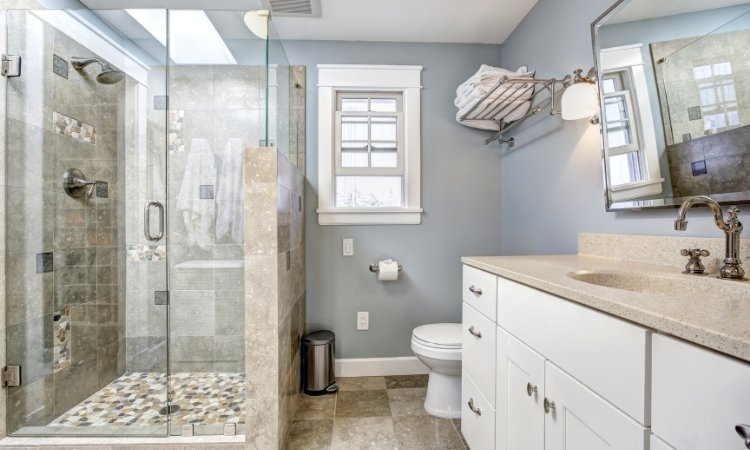Shower Door Ventilation is something most homeowners in Singapore don’t think about until mold starts growing or cleaning the bathroom becomes a weekly struggle. But in a country where the humidity never takes a break, even a small detail like air movement through your shower door can make a big difference.
I’ve worked on multiple bathroom improvement projects across HDB flats and condos and landed homes in Singapore. I’ve seen firsthand how poor ventilation can turn a clean shower into a breeding ground for mold and how just adding one small vent can reduce daily moisture levels and cut down cleaning time.
Let’s break down how Shower Door Ventilation affects humidity and maintenance in Singapore. Therefore, a well-known shower screen professional, LS Shower Screen Singapore, explains shower door ventilation affects humidity and maintenance in Singapore. Moreover, they also offer all kinds of shower screen services, including sliding door shower screens, black frame shower screens, and glass shower screens.
Why Singapore Bathrooms Need Proper Ventilation
Singapore’s tropical climate means high humidity levels all year round. Most of us shower two or more times a day because of the heat. That constant steam builds up quickly, especially in bathrooms without windows or with poor airflow. Over time, this trapped moisture seeps into grout lines, wall corners, and even fixtures, leading to:
- Persistent dampness
- Mold and mildew
- Rust on metal parts
- Paint peeling on walls
- A musty smell that’s hard to eliminate
While exhaust fans and open windows help, Shower Door Ventilation adds a targeted solution inside the shower area itself.

How Shower Screen Ventilation Affects Humidity and Maintenance
So, how does it work?
When your shower door is completely sealed, steam has nowhere to go. It lingers, increasing the humidity level inside your bathroom. On the other hand, when you have ventilation either through small gaps, louvers, or purpose-built vents at the top or bottom of the shower door, air circulates more freely.
Here’s how Shower Door Ventilation affects humidity and maintenance directly:
1. Reduces Steam Buildup
A fully enclosed shower door can create a space where steam cannot escape. On the other hand, if the top or bottom of the door has small vents, steam can get out. It helps the shower stay dryer after use. In a client’s condo bathroom I recently worked on, we added a slim vent to the upper part of the shower door. Within days, they noticed less fog on their mirrors and a fresher-smelling space.
2. Prevents Mold and Stains
I once worked on a resale flat where the shower had no ventilation. Mold had grown thick along the bottom edges of the glass door and on the silicone joints. In homes where the shower has airflow, that buildup takes much longer to form. It’s not just about mold. Water stains, soap residue, and slimy grout are also less likely to appear when surfaces dry faster.
3. Less Effort During Cleaning
In homes with poor shower ventilation, cleaning takes longer. You need strong cleaners and brushes to scrub off stubborn mold and stains. When the shower is well-ventilated, surfaces stay dry and don’t need as much attention. One homeowner in Bukit Batok told me they went from cleaning their shower twice a week to once every two weeks after fixing their ventilation.
4. Extends the Life of Bathroom Fixtures
Metal parts in the shower rust faster when exposed to constant moisture. I’ve seen rusty screws, discolored hinges, and even warped shower door handles in poorly ventilated bathrooms. With good Shower Door Ventilation, the humidity drops quicker, which helps protect your fittings. One simple vent can save you from replacing your fixtures every year.

Importance of Shower Door Ventilation in Everyday Life
In many BTO flats and newer condos, bathrooms have full glass shower enclosures. These look clean and modern, but most of them are completely sealed. That means steam from your shower gets stuck inside the glass area.
This is a problem in small bathrooms, especially when there’s no exhaust fan or window nearby. If you’ve noticed that your bathroom stays damp or smells musty even hours after a shower, chances are your shower screen affects bathroom ventilation in Singapore.
I recommend choosing a shower screen that has built-in air vents or at least allows for a small gap at the top. If your current shower is tightly sealed, a professional can install a small grille or vent on the door. It doesn’t change how the door looks much, but it makes a big difference in how the air flows.
Conclusion: The Real Value of Shower Door Ventilation
Singapore’s bathrooms face a constant battle with heat and moisture. While you can’t control the weather, you can control how your bathroom handles steam. Shower Door Ventilation gives that steam a way out, reducing humidity, preventing mold, and cutting down your cleaning time. It’s a small upgrade with a big return, one that protects your bathroom in the long run.
If your bathroom still feels wet hours after a shower, it might not be your fan or your tiles; it could be your shower door. Add a vent, leave a gap, or talk to a local specialist. The change is simple, but the difference it makes is easy to feel.

